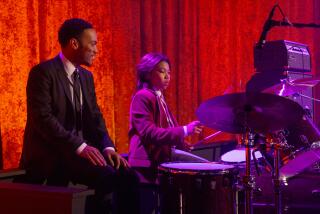MOVIE REVIEW : ‘Graffiti Bridge’: A Bridge Too Far
- Share via
The new Prince movie, “Graffiti Bridge” (citywide), is a blend of vaulting emotions and sentimental fluff, MTV and ersatz inspirationalism, dry ice and hot flesh, phony angels and searing funk. It’s a mixed bag; parts of it are awful. But it has, and needs, only one major defense: It’s full of Grade-A rock ‘n’ roll, rousingly well performed. It moves, it swings, it jumps and vibrates. It’s a musical .
Prince’s stirring 1984 debut “Purple Rain”--to which “Graffiti Bridge” is a sequel--fusing the new rock-video techniques with a story line, was part archetypal backstage musical, part pastiche ‘60s psycho-drama and part quasi-autobiographical fairy tale.
But his 1987 directorial debut, “Under the Cherry Moon,” got him murderous reviews and widespread ridicule. Coming after this notorious shellacking, “Graffiti Bridge”--for which, this time, he composed, starred, directed and wrote--may seem a retreat. Running for cover, reverting to Hollywood formula, he makes “Purple Rain 2.”
Yet there are good reasons for making a “Purple Rain 2,” and it’s not, like most sequels, a simple, spiritless repetition of the first movie. “Purple Rain” was about a young artist-rocker, learning to transcend selfishness after painful family and career traumas. This movie, less personal, is a blatant fable about the battle between love and lust, spirituality and commerce, idealism and greed--and, if it presents those conflicts in garish, over-broad terms, they’re not inappropriate for a pop musical.
The overheated style of “Rain,” directed by Albert Magnoli, is carried over here: “Bridge,” like “Rain,” takes place in a never-never Minneapolis, a sound-stage re-creation of its old Seven Corners nightclub area. The gaudy sets are larger than life and shot--by Bill Butler--from wild angles frenetically cut together. The actor-performers make a dance out of their movements and a song out of their lines.
As the rebellious Kid, Prince has the languid, wary gestures and shoulder-length hair of a ‘60s androgyne and flower child, and the primary villain, Morris Day--as “Morris Day,” the unsavory, hilarious character he also played in “Purple Rain”--struts and arches amusingly, before breaking into his trademark staccato screeches of derision and mirth. His sidekick, Jerome Benton, smirks and shakes with him in unison.
Just as “Cherry Moon” proved that Prince the actor should abandon all ambitions to become the new Rudolph Valentino, both this movie and “Moon” show that Prince the moviemaker has lots of visual style, hampered by some problems in writing, and selecting, scripts. But a key to his artistic personality is the extent to which he’s let both Day and Benton steal scenes in his movies. Seemingly a narcissist, he keeps pushing other talents forward.
There are showcase moments for most of the rest of the cast: Ingrid Chavez--whose face in repose resembles the young Glenda Jackson’s--as an angelic poet; Jill Jones as a faithless girlfriend; Robin Power as a dizzyingly statuesque woman scorned; the great gospel singer Mavis Staples and George Clinton as club owners; and 13-year-old Tevin Campbell, as, one guesses, the Voice of the Future. Staples stops the show as smashingly here as in “The Last Waltz,” when she closed “The Weight” with the delighted gasp, “Be-yootiful!”
The movie has a weird dichotomy. So obsessed with sensuality that it focuses on writhing buttocks and thighs throughout, it winds up swooning into spirituality: a movie-movie mysticism with faint echoes of Vincente Minnelli and “Brigadoon.” In a conventional film, that might have been ruinous. But “Graffiti Bridge” (MPAA rated PG-13, despite liberal sexuality) has Prince’s heart-catching music to carry it home; it can sock across spirituality with a hair-raising climactic gospel number.
Can rock ‘n’ roll save your soul? It’s a mark of Prince’s high talent, naivete, ambition and stubbornness that he still, apparently, thinks so.
More to Read
Only good movies
Get the Indie Focus newsletter, Mark Olsen's weekly guide to the world of cinema.
You may occasionally receive promotional content from the Los Angeles Times.










